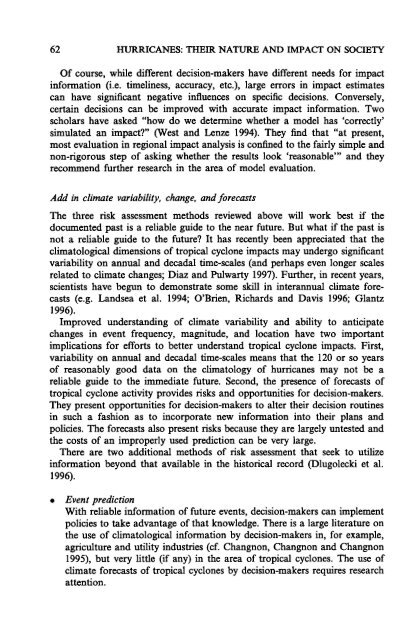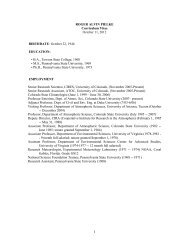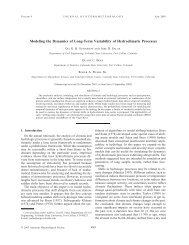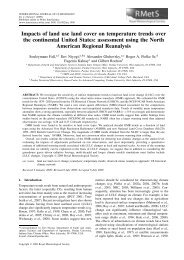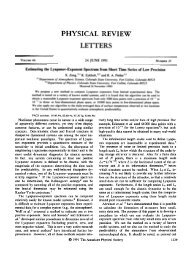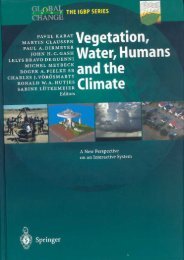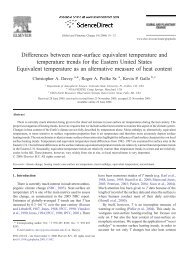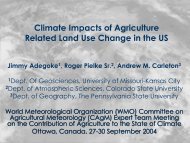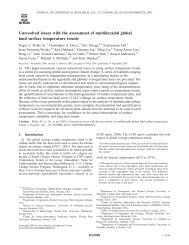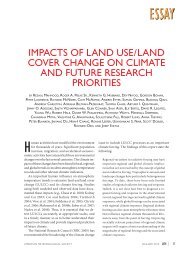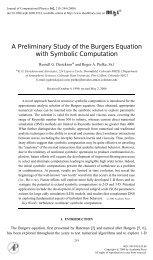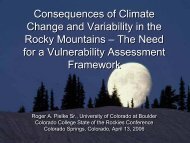Hurricanes: Their Nature and Impacts on Society - Climate Science ...
Hurricanes: Their Nature and Impacts on Society - Climate Science ...
Hurricanes: Their Nature and Impacts on Society - Climate Science ...
You also want an ePaper? Increase the reach of your titles
YUMPU automatically turns print PDFs into web optimized ePapers that Google loves.
.<br />
62<br />
HURRICANES: THEIR NATURE AND IMPACT ON SOCIETY<br />
Of course, while different decisi<strong>on</strong>-makers have different needs for impact<br />
informati<strong>on</strong> (i.e. timeliness, accuracy, etc.), large errors in impact estimates<br />
can have significant negative influences <strong>on</strong> specific decisi<strong>on</strong>s. C<strong>on</strong>versely,<br />
certain decisi<strong>on</strong>s can be improved with accurate impact informati<strong>on</strong>. Two<br />
scholars have asked "how do we determine whether a model has 'correctly'<br />
simulated an impact?" (West <str<strong>on</strong>g>and</str<strong>on</strong>g> Lenze 1994). They find that "at present,<br />
most evaluati<strong>on</strong> in regi<strong>on</strong>al impact analysis is c<strong>on</strong>fined to the fairly simple <str<strong>on</strong>g>and</str<strong>on</strong>g><br />
n<strong>on</strong>-rigorous step of asking whether the results look 'reas<strong>on</strong>able'" <str<strong>on</strong>g>and</str<strong>on</strong>g> they<br />
recommend further research in the area of model evaluati<strong>on</strong>.<br />
Add in climate variability, change, <str<strong>on</strong>g>and</str<strong>on</strong>g> forecasts<br />
The three risk assessment methods reviewed above will work best if the<br />
documented past is a reliable guide to the near future. But what if the past is<br />
not a reliable guide to the future? It has recently been appreciated that the<br />
climatological dimensi<strong>on</strong>s of tropical cycl<strong>on</strong>e impacts may undergo significant<br />
variability <strong>on</strong> annual <str<strong>on</strong>g>and</str<strong>on</strong>g> decadal time-scales (<str<strong>on</strong>g>and</str<strong>on</strong>g> perhaps even l<strong>on</strong>ger scales<br />
related to climate changes; Diaz <str<strong>on</strong>g>and</str<strong>on</strong>g> Pulwarty 1997). Further, in recent years,<br />
scientists have begun to dem<strong>on</strong>strate some skill in interannual climate forecasts<br />
(e.g. L<str<strong>on</strong>g>and</str<strong>on</strong>g>sea et al. 1994; O'Brien, Richards <str<strong>on</strong>g>and</str<strong>on</strong>g> Davis 1996; Glantz<br />
1996).<br />
Improved underst<str<strong>on</strong>g>and</str<strong>on</strong>g>ing of climate variability <str<strong>on</strong>g>and</str<strong>on</strong>g> ability to anticipate<br />
changes in event frequency, magnitude, <str<strong>on</strong>g>and</str<strong>on</strong>g> locati<strong>on</strong> have two important<br />
implicati<strong>on</strong>s for efforts to better underst<str<strong>on</strong>g>and</str<strong>on</strong>g> tropical cycl<strong>on</strong>e impacts. First,<br />
variability <strong>on</strong> annual <str<strong>on</strong>g>and</str<strong>on</strong>g> decadal time-scales means that the 120 or so years<br />
of reas<strong>on</strong>ably good data <strong>on</strong> the climatology of hurricanes may not be a<br />
reliable guide to the immediate future. Sec<strong>on</strong>d, the presence of forecasts of<br />
tropical cycl<strong>on</strong>e activity provides risks <str<strong>on</strong>g>and</str<strong>on</strong>g> opportunities for decisi<strong>on</strong>-makers.<br />
They present opportunities for decisi<strong>on</strong>-makers to alter their decisi<strong>on</strong> routines<br />
in such a fashi<strong>on</strong> as to incorporate new informati<strong>on</strong> into their plans <str<strong>on</strong>g>and</str<strong>on</strong>g><br />
policies. The forecasts also present risks because they are largely untested <str<strong>on</strong>g>and</str<strong>on</strong>g><br />
the costs of an improperly used predicti<strong>on</strong> can be very large.<br />
There are two additi<strong>on</strong>al methods of risk assessment that seek to utilize<br />
informati<strong>on</strong> bey<strong>on</strong>d that available in the historical record (Dlugolecki et al.<br />
1996).<br />
Event predicti<strong>on</strong><br />
With reliable informati<strong>on</strong> of future events, decisi<strong>on</strong>-makers can implement<br />
policies to take advantage of that knowledge. There is a large literature <strong>on</strong><br />
the use of climatological informati<strong>on</strong> by decisi<strong>on</strong>-makers in, for example,<br />
agriculture <str<strong>on</strong>g>and</str<strong>on</strong>g> utility industries (cf. Changn<strong>on</strong>, Changn<strong>on</strong> <str<strong>on</strong>g>and</str<strong>on</strong>g> Changn<strong>on</strong><br />
1995), but very little (if any) in the area of tropical cycl<strong>on</strong>es. The use of<br />
climate forecasts of tropical cycl<strong>on</strong>es by decisi<strong>on</strong>-makers requires research<br />
attenti<strong>on</strong>.


